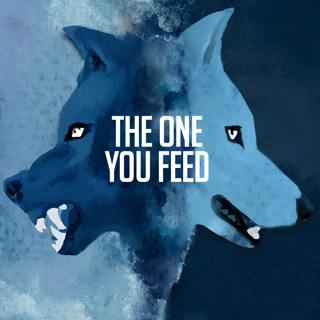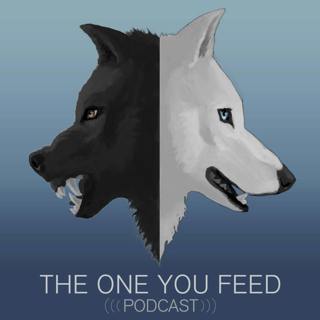
Why Willpower Isn’t Enough: The Tiny Habits Method Explained with Dr. BJ Fogg
If you’re feeling overwhelmed and don’t have the luxury of doing less, Overwhelm Is Optional offers simple tools you can use in under ten minutes a day. Learn more at oneyoufeed.net/overwhelm Help us make the podcast better—share your input in a short survey:: oneyoufeed.net/survey. Thank You! In this episode, Dr. BJ Fogg, explains why willpower isn’t enough and the science behind his tiny habits method. He explores the psychology of habit formation, emphasizing that lasting change comes from starting small, celebrating successes, and practicing self-compassion rather than relying on willpower or self-criticism. Dr. Fogg shares practical strategies for designing habits that fit individual contexts, explains his behavior model, and discusses how positive reinforcement and flexibility foster sustainable transformation. Personal stories and vivid analogies illustrate how anyone can create meaningful change by nurturing tiny habits and focusing on progress over perfection. Exciting News!!!Coming in March 2026, my new book, How a Little Becomes a Lot: The Art of Small Changes for a More Meaningful Life is now available for pre-orders! Key Takeaways Behavior change and habit formation The “Tiny Habits” method and its principles The importance of positivity in personal transformation Breaking down aspirations into small, manageable actions Embracing mistakes as learning opportunities The role of self-compassion in habit formation The Fogg Behavior Model: motivation, ability, and prompts The significance of context in habit design Strategies for troubleshooting and enhancing behavior change The impact of celebrating small successes on habit reinforcement For full show notes, click here! Connect with the show: Follow us on YouTube: @TheOneYouFeedPod Subscribe on Apple Podcasts or Spotify Follow us on Instagram If you enjoyed this conversation with Dr. BJ Fogg, check out these other episodes: How to Create Elastic Habits that Adapt to Your Day with Stephen Guise How to Make Lasting Changes with John Norcross By purchasing products and/or services from our sponsors, you are helping to support The One You Feed, and we greatly appreciate it. Thank you! This episode is sponsored by: Aura Frames: For a limited time, save on the perfect gift by visiting AuraFrames.com /FEED to get $35 off Aura’s best-selling Carver Mat frames – named #1 by Wirecutter – by using promo code FEED at checkout. This deal is exclusive to listeners, and frames sell out fast, so order yours now to get it in time for the holidays! Uncommon Goods has something for everyone – you’ll find thousands of new gift ideas that you won’t find anywhere else, and you’ll be supporting artists and small, independent businesses. To get 15% off your next gift, go to UNCOMMONGOODS.com/FEED LinkedIn: Post your job for free at linkedin.com/oneyoufeed. Terms and conditions apply. Learn more about your ad choices. Visit megaphone.fm/adchoices
23 Dec 202555min

Why Anxiety is a Habit - and How Curiosity Helps Break the Loop with Dr. Jud Brewer
In this episode, Dr. Jud Brewer explains why anxiety is a habit and how curiosity breaks that habit loop. He explores the difference between the feeling of anxiety and the mental habit of worry, and why curiosity and self-compassion are essential for real change. Drawing from his clinical work and research on digital therapeutics and AI-supported therapy, Dr. Brewer shows how learning from setbacks—and building distress tolerance—helps us recognize progress, unwind shame, and create lasting transformation. Help us make the podcast better—share your input in a short survey:: oneyoufeed.net/survey. Thank You! Exciting News!!!Coming in March 2026, my new book, How a Little Becomes a Lot: The Art of Small Changes for a More Meaningful Life is now available for pre-orders! Key Takeaways Exploration of mental health and the role of habits in anxiety management. Discussion of the parable of the two wolves and its relation to neuroscience and habit reinforcement. Examination of the science of habit formation and the limitations of traditional habit replacement strategies. Insights into digital therapeutics and the development of app-based mental health treatments. Analysis of the potential and challenges of AI in therapy, including ethical considerations. The importance of human connection in therapy and the unique value of human therapists. The role of curiosity in managing anxiety and the distinction between anxiety as a feeling and worrying as a behavior. The impact of self-criticism and shame on behavior change and the importance of self-compassion. Techniques for cultivating distress tolerance and the gradual process of emotional growth. Mindfulness practices, such as noting, to enhance awareness and reduce reactivity in challenging situations. For full show notes, click here! Connect with the show: Follow us on YouTube: @TheOneYouFeedPod Subscribe on Apple Podcasts or Spotify Follow us on Instagram If you enjoyed this conversation with Dr. Jud Brewer, check out these other episodes: How to Manage Your Hunger Habit with Dr. Jud Brewer Habits for Healing Anxiety with Dr. Jud Brewer By purchasing products and/or services from our sponsors, you are helping to support The One You Feed, and we greatly appreciate it. Thank you! This episode is sponsored by: Aura Frames: For a limited time, save on the perfect gift by visiting AuraFrames.com /FEED to get $35 off Aura’s best-selling Carver Mat frames – named #1 by Wirecutter – by using promo code FEED at checkout. This deal is exclusive to listeners, and frames sell out fast, so order yours now to get it in time for the holidays! Uncommon Goods has something for everyone – you’ll find thousands of new gift ideas that you won’t find anywhere else, and you’ll be supporting artists and small, independent businesses. To get 15% off your next gift, go to UNCOMMONGOODS.com/FEED LinkedIn: Post your job for free at linkedin.com/oneyoufeed. Terms and conditions apply. Learn more about your ad choices. Visit megaphone.fm/adchoices
19 Dec 20251h 12min

Listen Now: Decoding Women’s Health with Dr. Elizabeth Poynor
Here’s a preview of a new show from our friends at Pushkin Industries and the Atira Health and Research Institute. On Decoding Women’s Health, Dr. Elizabeth Poynor makes the science of women’s health accessible—from hormones to metabolism to longevity—so you can thrive at any stage of life. A world-renowned gynecologic oncologist and advanced pelvic surgeon, Dr. Poynor speaks with leading physicians, researchers, and educators to share the latest science on women’s wellness, disease prevention, and what it really means to age on your own terms. Dr. Poynor recently sat down with preventive neurologist Dr. Richard Isaacson, who shares how to know if you’re at risk for Alzheimer’s, how shifting hormones can make women especially vulnerable, and what steps to take for better long-term brain health. For more episodes on how to improve your health during midlife, find Decoding Women’s Health with Dr. Elizabeth Poynor wherever you get podcasts. Learn more about your ad choices. Visit megaphone.fm/adchoices
17 Dec 202552min

Designing a Life That Supports You: Presence, Beauty, and the Power of Environment with Nate Berkus
In this episode, Nate Berkus explores what it really means to design a life that supports you—not through perfection, but through presence, beauty, and the power of environment. Drawing from decades of work and his own personal journey, Nate reflects on how our surroundings quietly shape our habits, emotions, and sense of self. He shares how moving through profound loss changed the way he understands home, meaning, and the moments that matter most. Through deeply human stories—including a transformative Oprah makeover—Nate reveals how small, intentional changes and genuine listening can create spaces that support healing, authenticity, and connection. Help us make the podcast better—share your input in a short survey:: oneyoufeed.net/survey. Thank You! Exciting News!!!Coming in March 2026, my new book, How a Little Becomes a Lot: The Art of Small Changes for a More Meaningful Life is now available for pre-orders! Key Takeaways The influence of environment and design on personal growth and habits. The parable of the two wolves and its relevance to personal choices and mindset. The significance of “the moments in between” in fostering genuine connections. The impact of parenting on awareness and presence in daily life. The importance of meaningful design that reflects personal stories and aspirations. The relationship between emotional well-being and physical spaces. The transformative power of small, intentional changes in one’s environment. The role of gratitude in overcoming past hardships and shaping identity. The necessity of human connection and understanding in design and life. The balance between personal taste and collaboration in shared living spaces. For full show notes, click here! Connect with the show: Follow us on YouTube: @TheOneYouFeedPod Subscribe on Apple Podcasts or Spotify Follow us on Instagram If you enjoyed this conversation with Nate Berkus, check out these other episodes: Failure as Fertilizer: Learning to Bloom Again with Debbie Millman Creative Thinking and Action Through Designs with Sarah Stein Greenberg By purchasing products and/or services from our sponsors, you are helping to support The One You Feed, and we greatly appreciate it. Thank you! This episode is sponsored by: Aura Frames: For a limited time, save on the perfect gift by visiting AuraFrames.com /FEED to get $35 off Aura’s best-selling Carver Mat frames – named #1 by Wirecutter – by using promo code FEED at checkout. This deal is exclusive to listeners, and frames sell out fast, so order yours now to get it in time for the holidays! Uncommon Goods has something for everyone – you’ll find thousands of new gift ideas that you won’t find anywhere else, and you’ll be supporting artists and small, independent businesses. To get 15% off your next gift, go to UNCOMMONGOODS.com/FEED LinkedIn: Post your job for free at linkedin.com/oneyoufeed. Terms and conditions apply. Learn more about your ad choices. Visit megaphone.fm/adchoices
16 Dec 20251h

When Your Brain Won’t Fit the World: Finding Your Creative Path with ADHD with Andy J. Pizza
In this episode, Andy J. Pizza joins Eric Zimmer for When Your Brain Won’t Fit the World: Finding Your Creative Path with ADHD, a conversation about creativity, identity, and what happens when you stop treating yourself as a problem to fix. Andy shares how discovering ADHD helped him reframe years of self-doubt, better understand his parents, and build a creative life that actually fits the way his mind works. Together, they explore self-acceptance, the role of labels, and how art can become a powerful way to excavate who we really are. Help us make the podcast better—share your input in a short survey:: oneyoufeed.net/survey. Thank You! Exciting News!!!Coming in March 2026, my new book, How a Little Becomes a Lot: The Art of Small Changes for a More Meaningful Life is now available for pre-orders! Key Takeaways ADHD as a form of neurodiversity rather than a personal deficit The connection between ADHD and creativity, imagination, and divergent thinking How self-compassion supports mental health and sustainable personal growth The role of diagnosis and language in understanding identity and behavior The influence of childhood and family dynamics on self-perception Moving from self-criticism to self-acceptance in creative and personal life Creativity as a tool for self-discovery, meaning, and emotional insight Designing habits and environments that support how your brain works For full show notes, click here! Connect with the show: Follow us on YouTube: @TheOneYouFeedPod Subscribe on Apple Podcasts or Spotify Follow us on Instagram If you enjoyed this conversation with Andy J. Pizza, check out these other episodes: Creativity as a Cure with Jacob Nordby Eric Tivers on ADHD in Adults By purchasing products and/or services from our sponsors, you are helping to support The One You Feed, and we greatly appreciate it. Thank you! This episode is sponsored by: Aura Frames: For a limited time, save on the perfect gift by visiting AuraFrames.com /FEED to get $35 off Aura’s best-selling Carver Mat frames – named #1 by Wirecutter – by using promo code FEED at checkout. This deal is exclusive to listeners, and frames sell out fast, so order yours now to get it in time for the holidays! Uncommon Goods has something for everyone – you’ll find thousands of new gift ideas that you won’t find anywhere else, and you’ll be supporting artists and small, independent businesses. To get 15% off your next gift, go to UNCOMMONGOODS.com/FEED LinkedIn: Post your job for free at linkedin.com/oneyoufeed. Terms and conditions apply. Learn more about your ad choices. Visit megaphone.fm/adchoices
12 Dec 20251h 2min

The Price of Wanting: How Desire Shapes Happiness, Fulfillment, and Who We Become with Eric Jorgenson
In this episode, Eric Jorgensen discusses the price of wanting and how desire shapes happiness, fulfillment, and who we become. He explores the power of useful beliefs, agency, and a growth mindset. Eric also delves into authenticity versus attachment, the role of judgment, managing desires, and the influence of environment on habits. Drawing on thinkers like Naval Ravikant and Elon Musk, discover practical strategies and philosophical insights for living intentionally, fostering optimism, and building a fulfilling, empowered life. Help us make the podcast better—share your input in a short survey:: oneyoufeed.net/survey. Thank You! Exciting News!!!Coming in March 2026, my new book, How a Little Becomes a Lot: The Art of Small Changes for a More Meaningful Life is now available for pre-orders! Key Takeaways: Personal growth and mindset development Cultivation of positive habits and beliefs The parable of two wolves representing internal good and bad qualities The concept of “useful beliefs” and their role in achieving desired outcomes The importance of agency and a growth mindset in personal development The impact of internal narratives on self-perception and motivation The balance between authenticity and attachment in relationships The development of judgment and its significance in decision-making The challenge of managing desires and their effect on happiness Strategies for creating an environment that supports positive habits and reduces temptations For full show notes, click here! Connect with the show: Follow us on YouTube: @TheOneYouFeedPod Subscribe on Apple Podcasts or Spotify Follow us on Instagram If you enjoyed this conversation with Eric Jorgenson, check out these other episodes: Are Your Desires Really Yours? How to Recognize and Reclaim What You Truly Want with Luke Burgis How to Find Zest in Life with Dr. John Kaag By purchasing products and/or services from our sponsors, you are helping to support The One You Feed, and we greatly appreciate it. Thank you! This episode is sponsored by: Aura Frames: For a limited time, save on the perfect gift by visiting AuraFrames.com /FEED to get $35 off Aura’s best-selling Carver Mat frames – named #1 by Wirecutter – by using promo code FEED at checkout. This deal is exclusive to listeners, and frames sell out fast, so order yours now to get it in time for the holidays! Uncommon Goods has something for everyone – you’ll find thousands of new gift ideas that you won’t find anywhere else, and you’ll be supporting artists and small, independent businesses. To get 15% off your next gift, go to UNCOMMONGOODS.com/FEED LinkedIn: Post your job for free at linkedin.com/oneyoufeed. Terms and conditions apply. Learn more about your ad choices. Visit megaphone.fm/adchoices
9 Dec 20251h 1min

From Family Secrets to Self-Discovery: How Understanding Our Past Heals Us with Carmen Rita Wong
In this episode, Carmen Rita Wong shares her journey from learning family secrets to self-discovery and how understanding our past heals us. She delves into forgiveness, personal responsibility, and the impact of upbringing, as well as practical strategies for self-examination and habit change. Carmen shares how therapy, compassion, and embracing her complex heritage helped her build resilience and authenticity, offering listeners insights on navigating identity, breaking cycles, and finding peace with the past. Exciting News!!!Coming in March 2026, my new book, How a Little Becomes a Lot: The Art of Small Changes for a More Meaningful Life is now available for pre-orders! Key Takeaways: Exploration of complex family history and identity Discussion of the memoir "Why Didn't You Tell Me" The parable of the two wolves and its relevance to personal growth Themes of forgiveness and personal responsibility The impact of childhood experiences on adult life The role of therapy in healing and self-examination Navigating multicultural identity and heritage The process of uncovering family secrets and understanding one's origins The importance of empathy and compassion in human relationships Strategies for habit change and personal transformation through small, intentional actions For full show notes, click here! Connect with the show: Follow us on YouTube: @TheOneYouFeedPod Subscribe on Apple Podcasts or Spotify Follow us on Instagram By purchasing products and/or services from our sponsors, you are helping to support The One You Feed, and we greatly appreciate it. Thank you! This episode is sponsored by: Aura Frames: For a limited time, save on the perfect gift by visiting AuraFrames.com /FEED to get $35 off Aura’s best-selling Carver Mat frames – named #1 by Wirecutter – by using promo code FEED at checkout. This deal is exclusive to listeners, and frames sell out fast, so order yours now to get it in time for the holidays! Uncommon Goods has something for everyone – you’ll find thousands of new gift ideas that you won’t find anywhere else, and you’ll be supporting artists and small, independent businesses. To get 15% off your next gift, go to UNCOMMONGOODS.com/FEED LinkedIn: Post your job for free at linkedin.com/oneyoufeed. Terms and conditions apply. Learn more about your ad choices. Visit megaphone.fm/adchoices
5 Dec 20251h 6min

You Become What You Practice: What It Takes to Heal Individually and Collectively with Prentis Hemphill
In this episode, Prentis Hemphill discusses how you become what you practice and what it takes to heal individually and collectively. Prentis explains how healing as an ongoing practice, the importance of embodiment, and the intersection of personal transformation and activism. Prentis also shares insights from their work in healing justice and the Black Lives Matter movement, emphasizing the power of community, somatic practices, and love as a force for change. This conversation highlights how cultivating awareness and relational skills can foster both individual and systemic healing, offering hope for more connected and compassionate futures. Exciting News!!!Coming in March 2026, my new book, How a Little Becomes a Lot: The Art of Small Changes for a More Meaningful Life is now available for pre-orders! Key Takeaways: Healing as an ongoing practice rather than a fixed destination. The significance of embodiment practices in personal transformation. The relationship between internal healing and external activism. The impact of cultural practices and ancestral rituals on healing and community connection. The interplay between self-acceptance and self-improvement. The role of somatic awareness in understanding oneself and others. The influence of aikido principles on personal and relational dynamics. The importance of community and mutual aid in the healing process. The challenges of navigating trauma within systemic contexts. The transformative power of love and connection in fostering change. For full show notes, click here! Connect with the show: Follow us on YouTube: @TheOneYouFeedPod Subscribe on Apple Podcasts or Spotify Follow us on Instagram By purchasing products and/or services from our sponsors, you are helping to support The One You Feed, and we greatly appreciate it. Thank you! This episode is sponsored by: Aura Frames: For a limited time, save on the perfect gift by visiting AuraFrames.com /FEED to get $35 off Aura’s best-selling Carver Mat frames – named #1 by Wirecutter – by using promo code FEED at checkout. This deal is exclusive to listeners, and frames sell out fast, so order yours now to get it in time for the holidays! Uncommon Goods has something for everyone – you’ll find thousands of new gift ideas that you won’t find anywhere else, and you’ll be supporting artists and small, independent businesses. To get 15% off your next gift, go to UNCOMMONGOODS.com/FEED LinkedIn: Post your job for free at linkedin.com/oneyoufeed. Terms and conditions apply. Learn more about your ad choices. Visit megaphone.fm/adchoices
2 Dec 20251h 3min






















